This article was medically reviewed by Shari Forschen, NP, MA and by wikiHow staff writer, Glenn Carreau. Shari Forschen is a Registered Nurse at Sanford Health in North Dakota. Shari has worked in healthcare since 1996 and her expertise lies in acute care bedside nursing on a medical oncology floor. She received her degree from Medcenter one College of Nursing in 2003 and her Family Nurse Practitioner Masters from the University of North Dakota in 2014. Shari is a member of the American Nurses Association.
There are 18 references cited in this article, which can be found at the bottom of the page.
wikiHow marks an article as reader-approved once it receives enough positive feedback. This article received 12 testimonials and 89% of readers who voted found it helpful, earning it our reader-approved status.
This article has been viewed 122,663 times.
There are many ways to get a stuffy nose—from allergies, a cold, or even acid reflux. Plus, it's just a common bedtime issue; when you lie down, more blood flows to your head, and that causes your nose to get stuffed up. Luckily, you can do lots of things to relieve your symptoms, both throughout the day and right before you go to bed. Read on, and we'll show you how to sleep with a stuffy nose, no matter what is causing it!
Steps
Prop your head up with pillows.
-
Keeping your head up improves sinus drainage during the night. If you're tossing and turning trying to get comfortable, stack a few pillows under your head to elevate it above the rest of your body. The best position when you have a stuffy nose is laying on your back with pillows holding your head up to drain the mucus more effectively.[1] X Research source
- This is a good preventative measure if you're prone to getting a stuffy nose at night due to acid reflux, dry air, or allergens around your bed. However, it'll also make breathing easier if you already have a stuffy nose!
Use acupressure.
-
Acupressure lets you activate pressure points to ease sinus discomfort. Press your left and right index fingers to either side of your nostrils at the base of your nose.[2] X Research source Hold your fingers in place for at least 3 minutes, applying firm but gentle pressure. This simple acupressure move will relieve the congestion in your nose and help you feel less stuffed up as you get ready to sleep!
- If your stuffy nose persists, repeat as needed to release the pressure in your sinuses.
Gargle with salt water.
-
Salt water can break up mucus and flush out the virus if you have a cold. Stir ½ tsp (2,500 mg) of salt into an 8 fluid ounces (240 mL) glass of warm water. Then, take a sip of the salt water and gargle it at the back of your throat before spitting it out.[3] X Research source Continue gargling as needed to make your stuffy nose feel better!
- If your throat is sore in addition to the stuffy nose (which is common for people with a cold), a saltwater gargle will relieve the pain and make it easier to swallow.
- Kids under 6 years old should not try this method.
Do a facial steam.
-
Steam clears out nasal passages, which improves the stuffy nose. Fill a pot with water and boil for a minute or two before removing it from the heat. Cover your head with a towel and position it over the steaming pot, keeping your face at least 12 inches (30 cm) away from the water.[4] X Trustworthy Source Harvard Medical School Harvard Medical School's Educational Site for the Public Go to source Close your eyes and slowly breathe in through your nose and out through your mouth, letting the steam clear your sinuses.
- Gently blow your nose during and after the treatment. You can do this every two hours or as often as your schedule permits.
- Add a few drops of essential oil to increase the facial steam's effectiveness. Eucalyptus, peppermint, and tea tree essential oils are all good options.
Take a steamy shower.
-
The steam from the shower will thin out the mucus in your nose. If you'd rather bathe than do a facial steam (or have the time to do both), hop in the shower. Set the water to be hot but not scalding, and be sure to close the bathroom door so that the steam gathers. Once the shower has been running for a few minutes, and the room is thoroughly steamed up, take several deep breaths to clear your nose.
- Alternatively, if you want the water extra hot to create a steamier environment, you can sit outside the shower and breathe as the steam gathers.[5] X Research source
Drink plenty of water.
-
Water keeps your nasal passages moist, preventing stuffiness. Thick mucus sticks in your nose more easily, making your stuffy nose that much worse! To loosen the mucus (and keep your nose from getting stuffed up before bed), drink plenty of water to stay hydrated all day long. Women should drink at least 11.5 cups (2.7 L) per day, while men should aim for 15.5 cups (3.7 L) of water daily.[6] X Trustworthy Source Cleveland Clinic Educational website from one of the world's leading hospitals Go to source
- Other fluids might make your stuffy nose worse. Avoid caffeine after 2 PM; while caffeine is useful for an energy boost, it can contribute to dehydration too.
- Avoid drinking alcohol before bed as well. It'll also dehydrate you and worsen your symptoms, so limit yourself to a drink in the afternoon or evening if you plan to consume alcohol.
Have chicken noodle soup.
-
Chicken noodle soup provides valuable nutrients and hydration. Plus, research suggests that some soup ingredients could have a small anti-inflammatory effect.[7] X Trustworthy Source PubMed Central Journal archive from the U.S. National Institutes of Health Go to source Regardless, the hot steam in chicken noodle soup can soothe your stuffy nose, and the soup itself will help you stay healthy while you’re feeling under the weather. Eat a bowl of soup for dinner so that the effects last into the night.
Drink hot herbal tea with honey.
-
Herbal tea can help you sleep, while honey improves cold symptoms. Plus, many teas have anti-viral and anti-inflammatory properties that make you feel better when you're sick. Make a cup of herbal tea; teas like chamomile, peppermint, lemon, ginger, and echinacea are all popular choices that'll soothe your throat and break up congestion. Once brewed, add a few drops of honey and stir it in.[8] X Trustworthy Source Harvard Medical School Harvard Medical School's Educational Site for the Public Go to source
- Whatever herbal tea you choose, check the label to make sure it doesn't contain any caffeine.
Eat spicy food.
-
Food containing the chemical compound capsaicin can ease congestion. Capsaicin is found naturally in chili peppers (which are notoriously hot) and is capable of thinning the mucus in your nose, reducing the stuffiness.[9] X Research source Therefore, eating salsa, hot sauce, curry, and other spicy foods that contain capsaicin can give you some welcome relief from your stuffy nose.
- Keep in mind that spicy food can also make your nose run more since capsaicin stimulates mucus secretion.
- If you have an upset stomach for any reason, it’s best to avoid spicy foods until you feel better.
- Spicy foods are also not advised if you’re treating symptoms caused by acid reflux, as they can make the condition worse.
Use a saline nasal spray.
-
Saline solution reduces inflammation and hydrates your nasal passages. Even if it doesn't fix your sinuses completely, saline (salt) spray can help loosen the pressure enough to get you to sleep. Purchase a bottle of saline nasal spray or make saline spray at home using water, salt, and a small spray bottle. Apply 2 squirts of the saline into each of your nostrils 4 to 5 times a day to clear your nose out.[10] X Trustworthy Source Cleveland Clinic Educational website from one of the world's leading hospitals Go to source
- Alternatively, use a Neti pot with saline solution to rinse the mucus from your nose. Turn your head to one side and put the tip of the Neti pot against your top nostril, pouring the solution in and waiting for it to flow out of your other nostril.
Apply a nasal strip.
-
The strips open up your nasal passage and aid breathing during sleep. You can pick up nasal strips at any pharmacy or get them online. They're easy to apply; simply follow the instructions on the package and place a nasal strip over your nose before bed to ease your stuffy nose and reduce snoring.[11] X Trustworthy Source Cleveland Clinic Educational website from one of the world's leading hospitals Go to source
Use menthol vapor rub on your chest.
-
Vapor rub opens up your airways and helps you sleep. Grab an over-the-counter menthol vapor rub and apply it to your chest and neck areas, following the instructions on the package to ensure it's applied properly. Most vapor rubs contain camphor or eucalyptus oil, which can make it easier to breathe while sleeping when combined with menthol.[12] X Trustworthy Source Cleveland Clinic Educational website from one of the world's leading hospitals Go to source
Get bedding covers.
-
If you have a dust mite allergy, bedding covers can reduce the effects. Pay attention to your symptoms: do you only seem to develop a stuffy nose when climbing into bed? If so, your body might be reacting to the presence of dust (and dust mites). Use a pillow protector and mattress cover to limit your exposure to the mites, which in turn will keep your nose clear and allow you to sleep easily.[13] X Trustworthy Source Cleveland Clinic Educational website from one of the world's leading hospitals Go to source
- Wash and change your sheets once per week, too! This will help relieve symptoms from any allergens within your bedding.[14] X Research source
- If you suspect your stuffy nose is caused by an allergy, make an appointment with your doctor to get an allergy test. From there, the doctor can confirm and help treat your allergies.
Diffuse essential oils.
-
Mint, eucalyptus, sage, lavender, and tea tree oils can ease cold symptoms. Many essential oils are thought to have anti-inflammatory properties which help treat sinus infections and reduce swelling.[15] X Research source Choose an aroma you like and use an essential oil diffuser to spread the scent around your bedroom.
Run a humidifier.
-
A humidifier adds water and heat to the air, making it easier to breathe. If you suffer from a stuffy nose due to dry air, get a humidifier and set it up in your bedroom. The water will evaporate during the night and help keep your sinuses damp. Even if you have a stuffy nose from a cold or allergies, dry air makes the congestion worse, so a humidifier can give you some welcome relief![16] X Trustworthy Source MedlinePlus Collection of medical information sourced from the US National Library of Medicine Go to source
- If you don't have a humidifier, fill up a large bowl of water and place it near your head for a quick alternative. The water will slowly evaporate and moisturize the air.
- To ensure that it keeps sending fresh, clean air into your home, make a point to clean the humidifier and filter every few weeks.
Set up an air filter.
-
Air filters eliminate air-borne allergens that can give you a stuffy nose. If you're allergic to pollen, dust, or even perfume in the air, you might get a stuffy nose from breathing it in.[17] X Trustworthy Source American College of Allergy, Asthma, and Immunology National professional organization of allergists, asthma specialists and immunologists that focuses on supporting and publishing research Go to source Invest in an air filter and run it in your bedroom for the night; it'll reduce the number of allergens in the air and in turn, make your stuffy nose feel better.
- For maximum effectiveness, pick an air filter with a high-efficiency particulate air (HEPA) filter.
Take allergy or cold medicine.
-
Over-the-counter medication can ease your symptoms before bed. Antihistamines will give you relief from sneezing, congestion, and other allergy symptoms if you have allergies. Many antihistamines also cause drowsiness, which is helpful since you need to sleep with your stuffy nose anyway![18] X Trustworthy Source National Health Service (UK) Public healthcare system of the UK Go to source If you have a cold, grab an over-the-counter decongestant to take before bed.
- Read the medication label before you open it, follow all dosage instructions, and take the medication at the prescribed intervals on the package to ensure your safety. Don’t mix different kinds of medication.
- While antihistamines and decongestants both soothe stuffed sinuses, decongestants are more effective with colds and other illnesses, while antihistamines specifically help against allergic reactions.
Talk to your doctor about medication.
-
If your stuffy nose persists or gets worse, it's best to consult a doctor. Monitor your symptoms and call your doctor if your stuffy nose produces a green or yellow discharge and fever or sinus pain, as you might have a sinus infection. Also, contact your doctor if your symptoms last more than 10 days, you see blood in your nasal discharge, or you develop a high fever.[19] X Trustworthy Source Centers for Disease Control and Prevention Main public health institute for the US, run by the Dept. of Health and Human Services Go to source
- Depending on your condition, your doctor might prescribe antibiotics or other treatment. Make sure you describe your symptoms accurately to give the doctor a good idea of your situation.
You Might Also Like

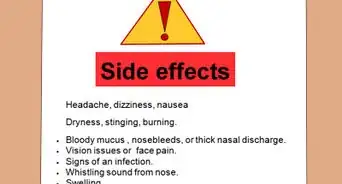
 16 Ways to Clear Nasal Congestion
16 Ways to Clear Nasal Congestion

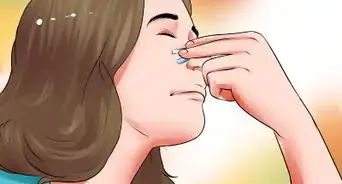

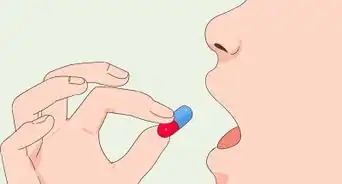





References
- ↑ https://www.mountsinai.org/health-library/symptoms/stuffy-or-runny-nose-adult
- ↑ https://youtu.be/E48mgHWIpOk?t=12
- ↑ https://blogs.bcm.edu/2014/08/20/saline-irrigation-offers-natural-option-for-sinus-infection-allergy-relief/
- ↑ https://www.health.harvard.edu/staying-healthy/what-to-do-about-sinusitis
- ↑ https://patient.info/ears-nose-throat-mouth/nasal-congestion
- ↑ https://my.clevelandclinic.org/health/symptoms/17660-runny-nose
- ↑ https://pubmed.ncbi.nlm.nih.gov/11035691/
- ↑ https://www.health.harvard.edu/staying-healthy/got-a-cold-try-some-honey
- ↑ https://jpma.org.pk/article-details/4025?article_id=4025
- ↑ https://my.clevelandclinic.org/health/symptoms/17980-nasal-congestion
- ↑ https://my.clevelandclinic.org/health/symptoms/17980-nasal-congestion
- ↑ https://health.clevelandclinic.org/cough-syrup-cough-drops-menthol-rub-whats-best-for-my-cough/
- ↑ https://my.clevelandclinic.org/health/diseases/17712-dust-mite-allergies
- ↑ https://www.aafa.org/dust-mite-allergy/
- ↑ https://www.nysinuscenter.com/2019/06/best-essential-oils-for-nasal-congestion/
- ↑ https://medlineplus.gov/ency/article/002104.htm
- ↑ https://acaai.org/allergies/allergic-conditions/dust-allergies/
- ↑ https://www.nhs.uk/conditions/antihistamines/
- ↑ https://www.cdc.gov/antibiotic-use/sinus-infection.html
About This Article
It can be hard to sleep when you have a stuffy nose, but there are a few tricks you can try to help you drift off. Prop your head up on some pillows in bed so your sinuses drain properly while you're sleeping. If you have a humidifier, set it up next to your bed to prevent your sinuses from getting dry. Or pour boiling water into a large bowl and hold your face over it for a few minutes. The steam from the boiling water will help clear up your sinuses. If you still can't sleep, try making a homemade nasal spray. Mix together ¼ teaspoon of salt, ½ teaspoon of baking soda, and 8 ounces of warm water. Then, spray 1-2 squirts into each nostril right before you go to sleep. To learn how to make a homemade chest rub to help yourself get to sleep, read on!
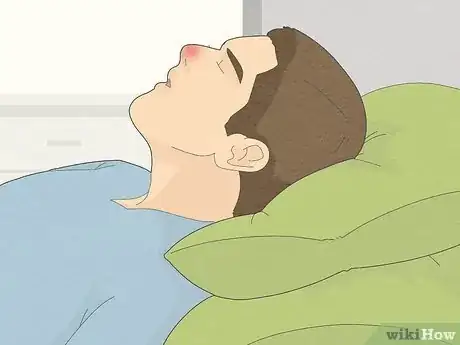
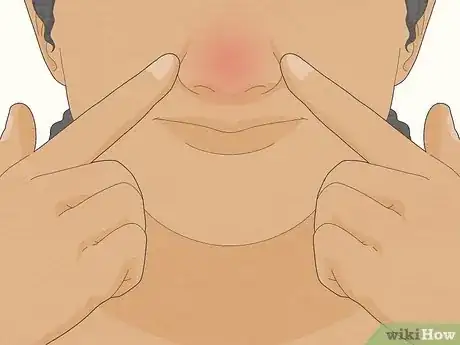
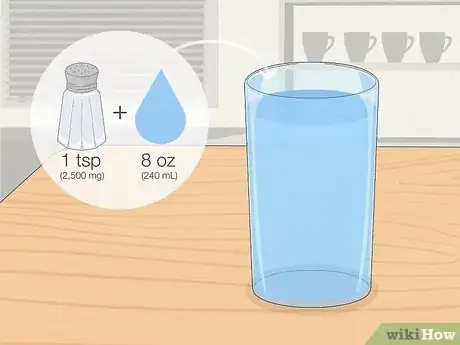
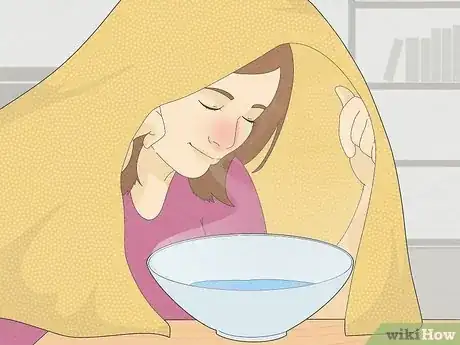
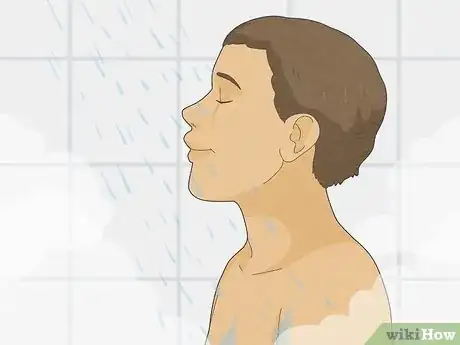
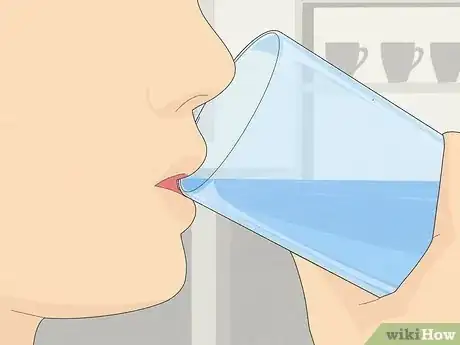
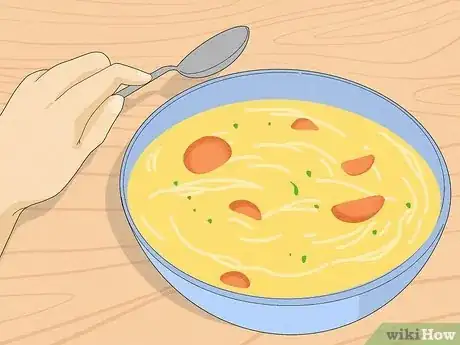
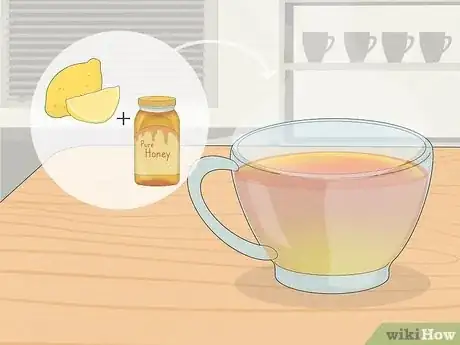


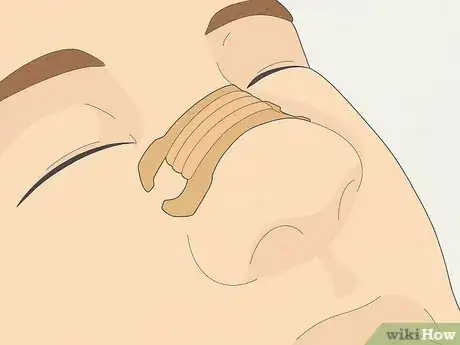
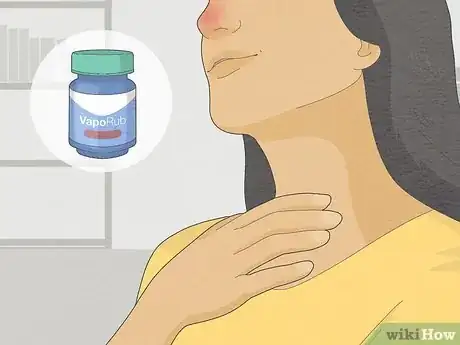
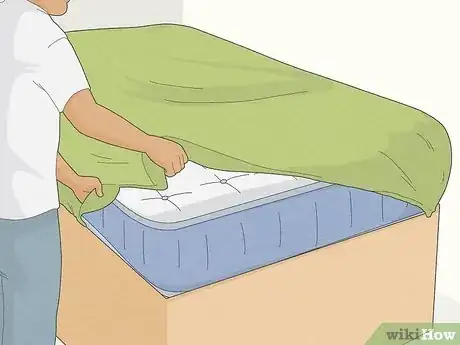
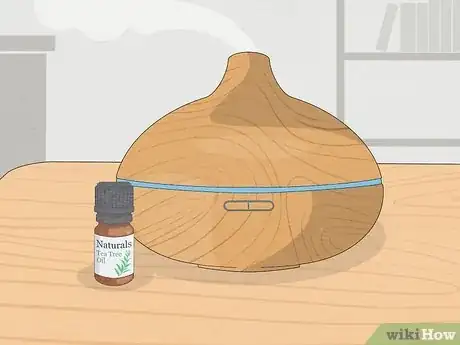
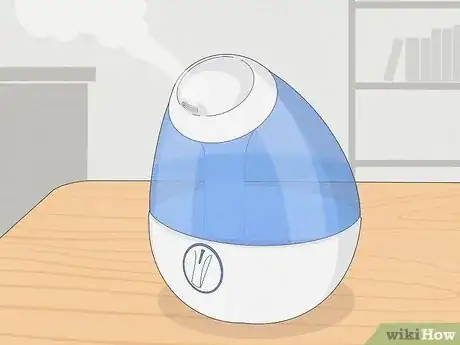
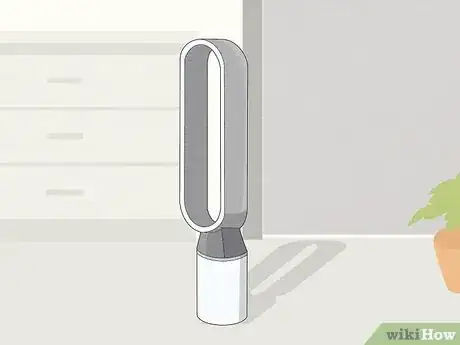
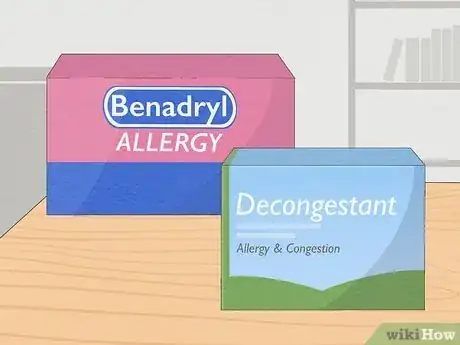
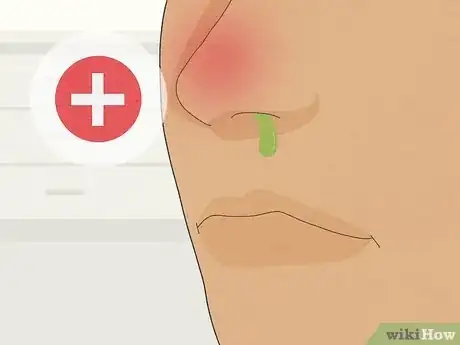











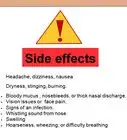

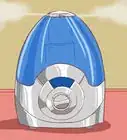



































Medical Disclaimer
The content of this article is not intended to be a substitute for professional medical advice, examination, diagnosis, or treatment. You should always contact your doctor or other qualified healthcare professional before starting, changing, or stopping any kind of health treatment.
Read More...